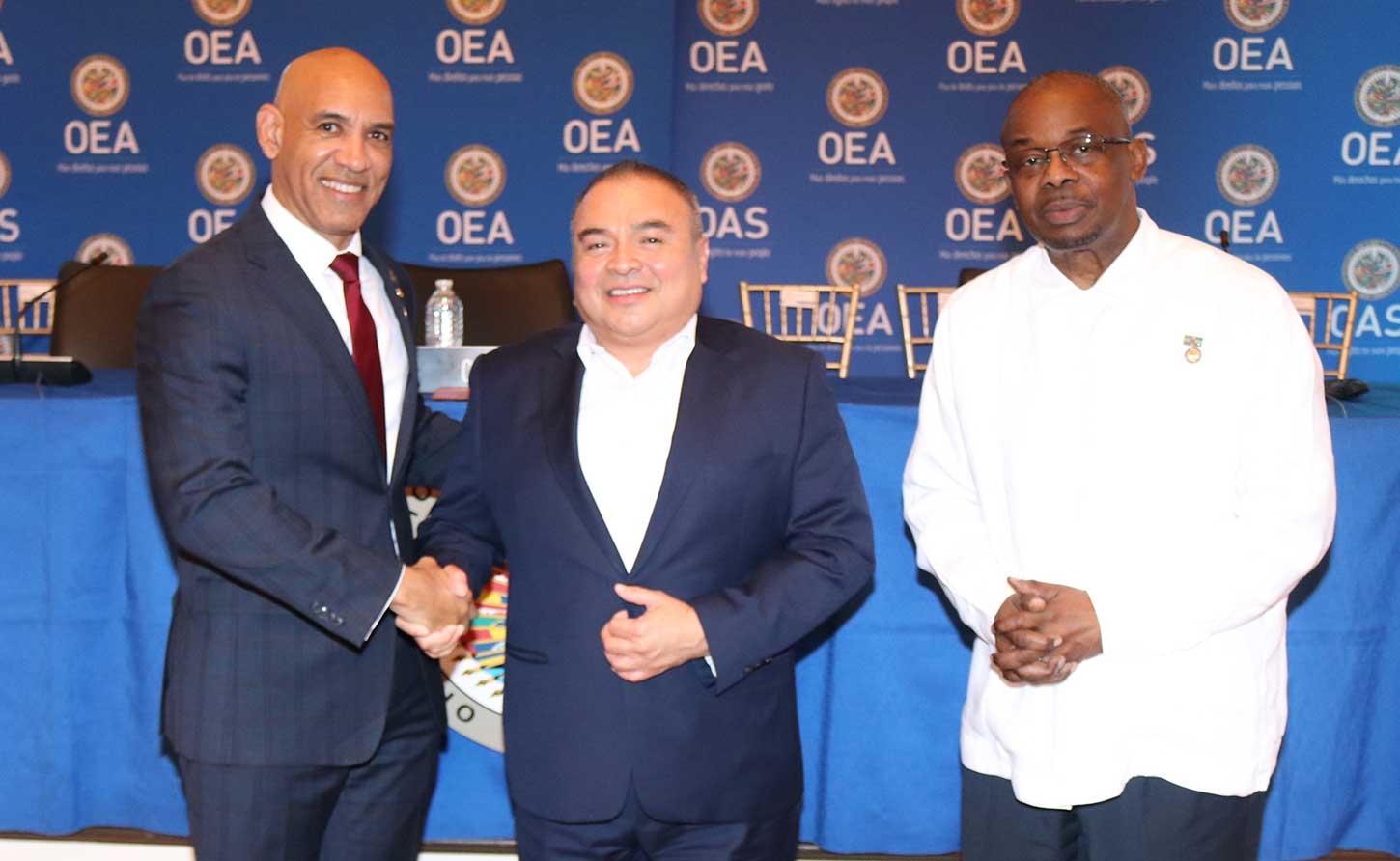JAMAICA Honors Departing OAS Diplomat as Historic Leadership Transition Unfolds

WASHINGTON, DC, July 10, 2025 - A decade of distinguished service came to an emotional close this week as Ambassador Nestor Mendez stepped down from his role as Assistant Secretary General of the Organization of American States, marking the end of an era for one of the hemisphere's most influential diplomatic voices.
In a poignant farewell ceremony at OAS headquarters in Washington, Jamaica’s Ambassador to the United States and Permanent Representative to the Organization of American States, Major General (Ret’d) Antony Anderson delivered tribute remarks that captured both the significance of Mendez's tenure and the historic transition that awaits.
Mendez, who began his second five-year term in 2020 after unanimous re-election by the General Assembly, concluded his service on July 11, 2025, leaving behind a legacy defined by his unwavering advocacy for the hemisphere's most vulnerable nations.
The Belizean diplomat's departure paves the way for Ambassador Laura Gil of Colombia, who becomes the first woman to hold the position in the organization's 77-year history.
Ambassador Anderson's tribute painted a portrait of a diplomat whose influence extended far beyond traditional corridors of power.
"Ambassador Mendez has served the Hemisphere with distinction, diplomacy and unwavering commitment over the past decade," Anderson stated, emphasizing how Mendez brought "a deep understanding of the challenges facing our region" to his role as Secretary to the Permanent Council.
For Caribbean nations, Mendez's tenure represented more than diplomatic protocol—it embodied a voice that understood the unique challenges facing Small Island Developing States in an increasingly complex global landscape.
Anderson particularly highlighted Mendez's steadfast engagement with CARICOM member states, noting his consistent advocacy on issues ranging from climate resilience to digital economy initiatives that directly impact the region's future.
The outgoing Assistant Secretary General's approach to hemispheric cooperation went beyond traditional diplomatic frameworks.
During his final remarks, Mendez reflected on his journey, acknowledging the "extraordinary challenges and groundbreaking achievements" that marked his tenure, including the modernization of OAS systems through technology and the introduction of artificial intelligence to streamline internal procedures.
Anderson's remarks revealed the depth of Mendez's commitment to inclusive diplomacy, describing him as "often a bridge between stakeholders, the Organization and civil society, between member states and multilateral partners, always encouraging constructive dialogue and mutual respect."
This bridge-building extended to his collaboration with the University of the West Indies and his initiatives in education, gender equality, and public health—areas that directly benefit Jamaica and its Caribbean neighbors.
The timing of Mendez's departure coincides with a period of significant transformation within the OAS. Ambassador Gil's election represents not just a changing of the guard, but a deliberate step toward greater gender representation in hemispheric leadership.
Her selection came after a competitive process that saw three women candidates—representing Colombia, Guatemala, and Peru—vie for the position, signaling a broader shift in regional diplomatic priorities.
Throughout his decade of service, Mendez prioritized climate change and natural disasters, advocated for women's rights and gender equality, and brought renewed focus to the plight of marginalized and vulnerable groups.
These priorities resonated particularly strongly with Caribbean nations grappling with the immediate impacts of climate change and the ongoing challenges of sustainable development in small island economies.
Anderson's tribute also celebrated Mendez's cultural diplomacy, noting his advocacy for celebrating the rich diversity of member states and ensuring that the OAS recognized national days and commemorative occasions.
"His leadership, in this regard, not only promoted unity but also underscored the value of cultural identity as a cornerstone of regional solidarity," Anderson observed.
The farewell ceremony reflected broader changes within the hemispheric organization, which continues to grapple with democratic challenges in Venezuela, Nicaragua, and other member states while working to strengthen regional cooperation on issues ranging from migration to economic development.
Mendez's tenure spanned these complex challenges, positioning him as a key architect of the organization's responses to evolving regional dynamics.
As the OAS prepares for Gil's leadership, the organization faces mounting pressure to demonstrate relevance in addressing contemporary hemispheric challenges.
Gil, a former Vice Minister of Foreign Affairs of Colombia and current Ambassador to Austria, received 19 votes in the second round of voting, compared to her closest competitor's 13, suggesting strong regional support for her vision of collaborative leadership.
Ambassador Anderson's closing words captured the emotional weight of the transition: "Ambassador Mendez, your calm diplomacy, infectious energy and unwavering professionalism will be greatly missed in these Halls. Thank you for your service. Please rest assured that you will always have the enduring respect and friendship of Jamaica."
The ceremony underscored the personal relationships that often drive diplomatic success, with Anderson's remarks revealing the genuine respect and affection that Mendez commanded across the hemisphere.
As the organization turns toward its next chapter under Gil's leadership, Mendez's decade of service stands as a testament to the power of principled diplomacy in an era of increasing global complexity.
The Organization of American States, founded in 1948, serves as the premier regional forum for political discussion, policy analysis and decision-making in Western Hemisphere affairs, bringing together 35 member states to address hemispheric issues and opportunities.
-30-
